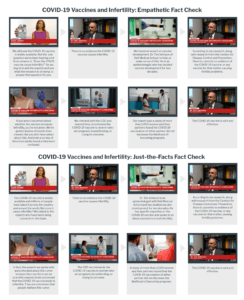
As misinformation continues to spread rapidly, reporting fact checks and attempting to correct people’s misperceptions has become an important task for journalists. Understanding which fact-checking approaches work best is key since people often cling to mistaken beliefs even when confronted with facts that prove those beliefs wrong.
To help broadcast news organizations with these efforts, the Center for Media Engagement tested two different fact-checking approaches – a more traditional, “just-the-facts” style that focused on factual evidence and explained why the misperception was wrong and a more empathetic style that walked viewers through the discovery of why the misperception was wrong.
Study Details
Participants in the study were randomly assigned to view one of three story topics:
- a fact-checking story about the safety of COVID-19 vaccines for children five and older
- a fact-checking story about the safety of COVID-19 vaccines for people who are pregnant or trying to conceive
- a weather story (the control condition)
Those who viewed a fact-checking story were randomly assigned to watch either a “just-the-facts” style story that focused on factual evidence or an “empathetic” style story where the newscaster walked the viewer through the process of finding the truth.
To test whether either of these approaches were able to correct misperceptions, participants were first asked about their beliefs on the safety of COVID-19 vaccines in a survey taken several weeks before viewing the news story and then a second time after viewing the story.
Storyboards: News Videos Viewed by Participants

Results and Takeaways
Both fact-checking approaches were equally effective in correcting misperceptions. These findings support the use of fact checks in broadcast news stories and show that reporters can use either of the approaches that were tested to produce an effective story.
The study also looked at whether the type of fact-checking approach would have different effects on people’s perceptions of news story credibility. Results showed that neither approach increased perceptions that the news story was credible. However, Democrats and those who vaccinated their children against COVID-19 rated both fact-checking stories as more credible than Republicans and those who did not vaccinate their children, indicating that political beliefs do influence how people perceive the news.


